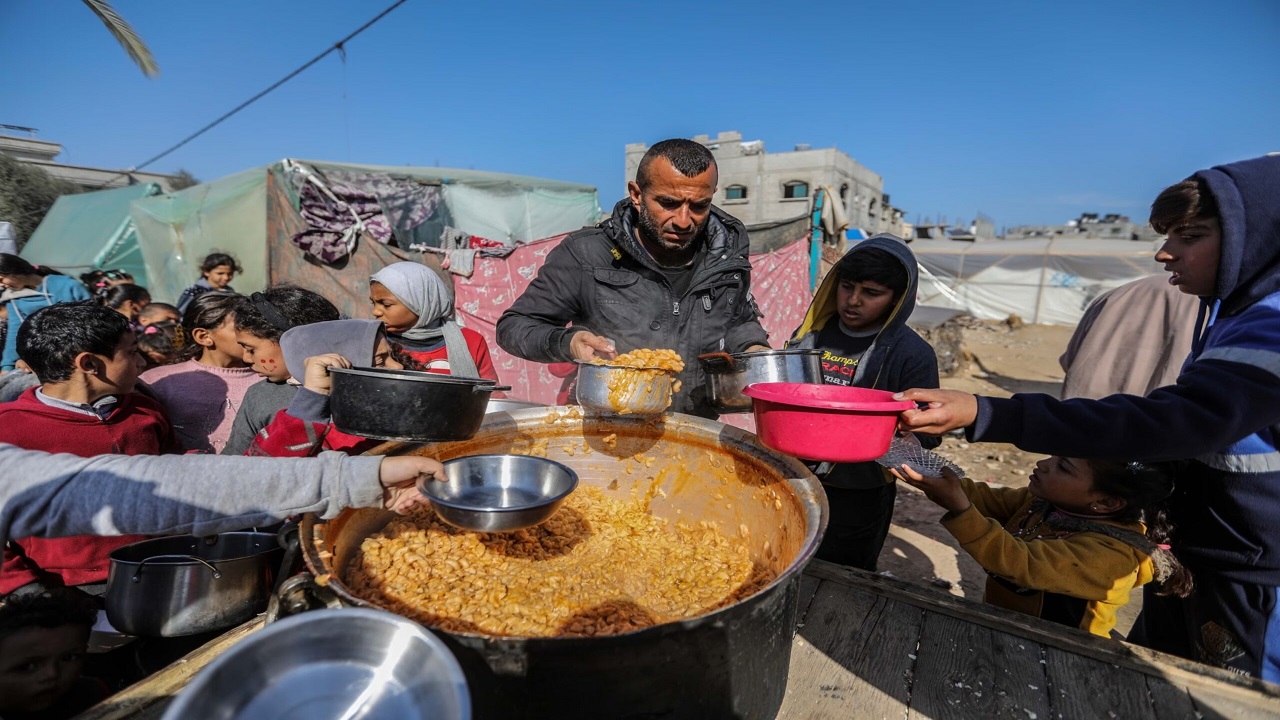Gaza on the Brink: Humanitarian Law, Famine, and International Inaction
Context:
The Gaza Strip is currently facing one of the worst humanitarian crises in recent history, marked by extreme food shortages, repeated displacement, and collapsing infrastructure. This situation has been exacerbated by a prolonged blockade, disrupted aid deliveries, and violations of international humanitarian law. The crisis is not only a human tragedy but also a test of international legal frameworks and multilateral cooperation.
Aid Distribution Chaos in Rafah
-
Around 50 people were shot and injured recently in Rafah, southern Gaza, during a chaotic aid distribution event.
-
The incident occurred at a site run by the Gaza Humanitarian Foundation (GHF), where thousands gathered in desperation for food.
-
The United Nations Relief and Works Agency (UNRWA) has distanced itself from GHF, citing violations of core humanitarian principles.
-
Jake Wood, the head of GHF, resigned on May 25, denouncing the group’s operational model as non-compliant with humanitarian norms.
Gaza Under Siege: Blockade and Famine Threat
-
Gaza has faced a total blockade for nearly 3 months, cutting off food, medicine, and fuel.
-
According to the Integrated Food Security Phase Classification (IPC) report released on May 12, acute food insecurity in Gaza has reached catastrophic levels.
-
The IPC is a global initiative that classifies the severity of food insecurity, involving UN agencies, governments, NGOs, and civil society.
Effect of the Ceasefire and Resumption of Blockade
-
During the January 19–March 18 ceasefire, aid temporarily reached minimum acceptable levels, slightly alleviating hunger.
-
After the ceasefire collapsed, aid deliveries halted for nearly 11 weeks, pushing over 1.1 million Gazans into crisis or worse food insecurity phases (IPC Phases 4 & 5).
Violation of International Humanitarian Law
-
The denial of food to civilians violates Article 54 of Additional Protocol I to the Geneva Conventions.
-
The article explicitly prohibits starvation as a method of warfare.
-
Using food as a political or military tool is classified as a war crime under international humanitarian law.
Aid Deliveries: Nowhere Near Sufficient
-
Israel reported that 665 aid trucks had entered Gaza recently.
-
The UN World Food Programme (WFP) termed this figure a "drop in the bucket".
-
Gaza requires a minimum of 500–600 aid trucks per day to meet basic human survival needs.
-
Confusion continues over how much aid reaches civilians, as inspection rules often force trucks to carry half-empty loads.
Why UN and NGOs Rejected GHF’s Aid Model
-
UN agencies and humanitarian actors refused to cooperate with GHF due to its collection-point distribution model, which:
-
Excludes immobile, elderly, or disabled populations.
-
Encourages crowding and chaos at central distribution hubs.
-
Violates humanitarian principles of humanity, neutrality, impartiality, and independence.
-
Forced Displacement and Unsafe "Safe Zones"
-
GHF’s model indirectly encourages forced displacement by restricting aid to select locations.
-
On average, Gazans have been displaced once a month since the conflict began.
-
Civilians are repeatedly moved to "safe zones" that are often neither safe nor well-equipped, undermining human dignity and access to aid.
UNRWA Operations Undermined by New Israeli Laws
-
Two Israeli laws passed in October 2024 (enforced from January 2025) have crippled UNRWA’s functioning, especially in East Jerusalem and the West Bank.
Impact in East Jerusalem
-
UNRWA was banned from operating in areas considered Israeli sovereign territory.
-
Consequences:
-
Visas of international staff were revoked.
-
UNRWA offices vacated.
-
Around 800 students were affected by school closures.
-
Clinics facing shutdown, affecting over 70,000 Palestinians.
-
Operational Breakdown in West Bank
-
A second law banned all direct contact between UNRWA and Israeli officials, dismantling vital coordination systems necessary for relief delivery and logistics.
UNRWA’s Continued Role in Gaza
-
Despite legal restrictions elsewhere, UNRWA remains fully operational in Gaza, where it is the largest humanitarian agency:
-
12,000 staff operate in Gaza (compared to just 300 across other UN bodies).
-
Key Services Provided
-
Logistics: Manages major aid warehouses and distribution networks.
-
Healthcare: Runs mobile clinics, offering tent-to-tent services for displaced populations.
-
Education: The "Back to Learning" initiative serves over 20,000 children with basic education and psychosocial support.
-
Sanitation: Staff manage waste removal in refugee camps (though not camp management itself).
Accountability and Neutrality Measures
-
UNRWA adheres to strict neutrality protocols:
-
In 2023, 19 staff members were accused by Israel of misconduct.
-
All were suspended immediately, and investigations were led by UN oversight bodies.
-
Although evidence was limited, 9 terminations were upheld based on balance of probabilities, though no explicit violations were substantiated.
-
India’s Role in Supporting Multilateral Action in Gaza
-
India, as a committed supporter of multilateralism, can:
-
Advocate for enforcement of International Court of Justice (ICJ) orders.
-
Uphold the UN General Assembly's resolutions.
-
Reinforce the importance of international law in conflict zones.
-
-
While multilateralism is imperfect, it remains the best mechanism for maintaining global peace, justice, and accountability. Weakening it risks promoting disorder and lawlessness in global affairs.




Comments (0)